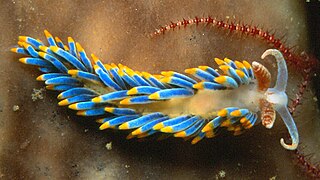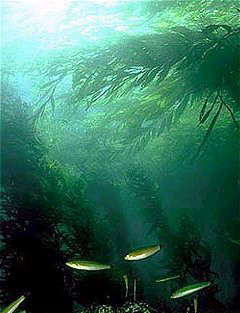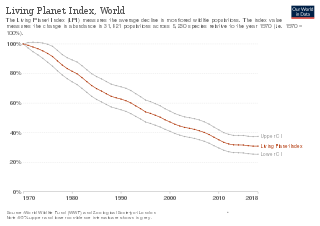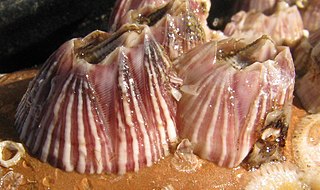
Seagrasses are the only flowering plants which grow in marine environments. There are about 60 species of fully marine seagrasses which belong to four families, all in the order Alismatales. Seagrasses evolved from terrestrial plants which recolonised the ocean 70 to 100 million years ago.

Nudibranchs are a group of soft-bodied marine gastropod molluscs that shed their shells after their larval stage. They are noted for their often extraordinary colours and striking forms, and they have been given colourful nicknames to match, such as "clown", "marigold", "splendid", "dancer", "dragon", and "sea rabbit". Currently, about 3,000 valid species of nudibranchs are known.

Kelp forests are underwater areas with a high density of kelp, which covers a large part of the world's coastlines. Smaller areas of anchored kelp are called kelp beds. They are recognized as one of the most productive and dynamic ecosystems on Earth. Although algal kelp forest combined with coral reefs only cover 0.1% of Earth's total surface, they account for 0.9% of global primary productivity. Kelp forests occur worldwide throughout temperate and polar coastal oceans. In 2007, kelp forests were also discovered in tropical waters near Ecuador.

Corophium volutator is a species of amphipod crustacean in the family Corophiidae. It is found in mudflats of the northern Atlantic Ocean. It is native to the north-east Atlantic Ocean, and has been introduced to the north-west Atlantic.

The Living Planet Index (LPI) is an indicator of the state of global biological diversity, based on trends in vertebrate populations of species from around the world. The Zoological Society of London (ZSL) manages the index in cooperation with the World Wide Fund for Nature (WWF).

The prasinophytes are a group of unicellular green algae. Prasinophytes mainly include marine planktonic species, as well as some freshwater representatives. The prasinophytes are morphologically diverse, including flagellates with one to eight flagella and non-motile (coccoid) unicells. The cells of many species are covered with organic body scales; others are naked. Well studied genera include Ostreococcus, considered to be the smallest free-living eukaryote, and Micromonas, both of which are found in marine waters worldwide. Prasinophytes have simple cellular structures, containing a single chloroplast and a single mitochondrion. The genomes are relatively small compared to other eukaryotes . At least one species, the Antarctic form Pyramimonas gelidicola, is capable of phagocytosis and is therefore a mixotrophic algae.
The ECI Prize is a prize awarded annually from 1986 onwards to an ecologist distinguished by outstanding and sustained scientific achievements. It is awarded jointly by the International Ecology Institute, a non-profit organization of research ecologists based in Germany dedicated to fostering ecological knowledge and awareness, and the Otto Kinne Foundation.
Tom Michael Fenchel is a Danish marine ecologist and professor first at the University of Aarhus, later at the University of Copenhagen. He is a highly cited scientist and known for, among other things, Fenchel's Law.

Posidonia is a genus of flowering plants. It contains nine species of marine plants ("seagrass"), found in the seas of the Mediterranean and around the south coast of Australia.

The Coastal and Estuarine Research Federation (CERF) is a private, nonprofit organization that was created in 1971. At that time, the members of two regionally based organizations, the Atlantic Estuarine Research Society (AERS) and the New England Estuarine Research Society (NEERS) recognized the need for a third estuarine organization that would address national estuarine and coastal issues. Today, CERF is a multidisciplinary federation of members and seven regionally based affiliate societies dedicated to the understanding and wise stewardship of estuaries and coasts worldwide.
Otto Kinne was a German marine biologist. He was director of Germany's Biologische Anstalt Helgoland from 1962 to 1984. From 1967 he was a professor at the University of Kiel. He established the Inter-Research Science Center (IRSC) in 1979 and is its Director, and the International Ecology Institute in 1984, of which he was the President. The IRSC publishes eight international journals of which Kinne is the founder, including Marine Ecology Progress Series and Climate Research. He established the Otto Kinne Foundation in 1992 to provide grants to ecologists in Russia and Eastern Europe.

Kinne Cemetery, also known as the Glasgo Cemetery and Old Kinne Burying Ground, is a historic cemetery in Jarvis Road in Griswold, Connecticut. The earliest marked stone is for Daniel Kinne who died in 1713. In the 1930s, the inscriptions of 79 stones in the Kinne Cemetery were recorded for the Hale Index. There are around 80 fieldstones with no carving or identification, but it is unknown if this stems from wearing of the gneiss stone or that there were no skilled carvers locally available. The seven carvers that have been identified are Lebbeus Kimball, Jotham Warren, Josiah Manning, Peter Barker, Mr. Huntington of Lebanon, E. Marston of Mystic Bridge and O. Doty of Stonington. The National Historic Register of Places nomination notes, "the cemetery is significant artistically because the carving on the stones gives many good examples of the funerary art that was characteristic of the 18th and 19th centuries in New England." The cemetery is notable because of the burial of Isaac C. Glasko, the namesake of the village of Glasgo, and a prominent African American land-holding man who ran a blacksmith shop that was important to the marine industry of the area. The cemetery was made a part of the Connecticut Freedom Trail in 1995 and it was added to the National Register of Historic Places on April 12, 2001.

Balanus trigonus is a species of barnacle in the family Balanidae. It is steep-sided, conical barnacle, has six shell plates and is pink in colour. They are opportunistic fouling organisms that are endemic to the Indo-Pacific region.

Kelly Benoit-Bird is a marine scientist and senior scientist at the Monterey Bay Aquarium Research Institute. Benoit-Bird uses acoustics to study marine organisms and was named a MacArthur Fellow in 2010.

The term oyster reef refers to dense aggregations of oysters that form large colonial communities. Because oyster larvae need to settle on hard substrates, new oyster reefs may form on stone or other hard marine debris. Eventually the oyster reef will propagate by spat settling on the shells of older or nonliving oysters. The dense aggregations of oysters are often referred to as an oyster reef, oyster bed, oyster bank, oyster bottom, or oyster bar interchangeably. These terms are not well defined and often regionally restricted.
Thavamani Jegajothivel Pandian, a retired professor of Madurai Kamaraj University (MKU), is an Indian geneticist and ecologist, known for his pioneering studies in bioenergetics and animal ecology. A recipient of the WorldFish Naga Award, he is a former chairman of the Task Force Committee on Aqua and Marine Biotechnology of the Department of Biotechnology of the Government of India, a former president and a fellow of The World Academy of Sciences and an elected fellow of the Indian National Science Academy, National Academy of Sciences, India, Indian Academy of Sciences and the National Academy of Agricultural Sciences. The Council of Scientific and Industrial Research, the apex agency of the Government of India for scientific research, awarded him the Shanti Swarup Bhatnagar Prize for Science and Technology, one of the highest Indian science awards, in 1984, for his contributions to biological sciences.
The International Ecology Institute (ECI) is a non-profit organization of research ecologists dedicated to promoting ecological knowledge and awareness. It was established in 1984, in the village of Oldendorf/Luhe, Germany by Inter-Research, a scientific publishing organisation founded in 1979 by Professor Otto Kinne.

A marine coastal ecosystem is a marine ecosystem which occurs where the land meets the ocean. Marine coastal ecosystems include many very different types of marine habitats, each with their own characteristics and species composition. They are characterized by high levels of biodiversity and productivity.
Roxane Maranger is a professor at Université de Montréal and Canada Research Chair Tier I in Aquqtic Ecosystem Science and Sustainability known for her research on the impact of humans on water quality in lakes. From July 2020 - July 2022, she served as the president of the Association for the Sciences of Limnology and Oceanography (ASLO).
Susanne Menden-Deuer is an oceanographer and marine scientist known for her work on marine food webs, including their structure and function. As of 2022 she is president-elect of the Association for the Sciences of Limnology and Oceanography.













